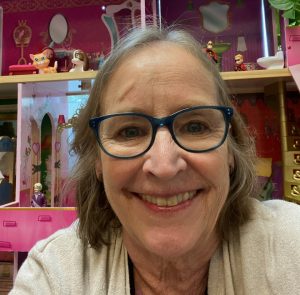
“What do you want for your life?”
Adopt-A-Family Mental Health Therapist Joan Kieffer often asks her clients this question, knowing these days, opportunities for self-reflection are few and far-between.
Right now, many families don’t really have the luxury to consider what they want. Needs must be met before desires are, and resources are too scarce to feel free to dream.
But as Kieffer reminds her clients, it is hope that will keep them moving forward. “They have to be able to envision the preferred future that they want,” says Kieffer. “If they can see it, they can achieve it.”
We are living in the aftershock of a world-shattering pandemic that hit low-income families harder than most – and still does. Among the many alarmingly negative effects of long-term isolation, Kieffer notes many patients are dealing with loss of self-confidence, loneliness, depression, and in an increasing number of cases, heightened tensions and toxicity in the home.
“The biggest common denominator among all my patients is trauma,” Kieffer tells us. “They are losing their self-confidence, but a lot of these people don’t realize the skill sets they’ve developed. You’ve lived in your car for four months, and somehow your children are still fed. That is a skill set. They are amazing. But they don’t see it like that.”
Kieffer recognizes that when it comes to securing housing, keeping hope alive is getting harder and harder.
“The reality is, they can’t afford to live here anymore. And a lot of these people, this is where their families are. They’ve been here for generations,” she explains.
Kieffer tells us of a client who doesn’t qualify for many affordable housing programs, but needs to find a home.
“She was crying, and she said, ‘Joan, I have searched every inch of Palm Beach County, and I cannot find a place.’ And I told her, ‘Give yourself a break. Come up for air. Take a day off where you’re not looking.’ But the discouragement is just so disheartening, because it is her reality.”

Joan Kieffer, Adopt-A-Family Mental Health Therapist
Kieffer recognizes that oftentimes, therapy focuses on improving a client’s perception of their circumstances. In these cases, a situation feels unmanageable at first, but can become manageable with the right therapy and thought-work. But right now, Kieffer notes, things are very different: Circumstances really are that bleak; there really aren’t attainable housing options. Clients feel backed into a corner, because they are.
We asked Kieffer to share one piece of advice she thinks everyone should hear today:
“Remember a time when it wasn’t so bad. Remember a time when it wasn’t so painful. I ask clients to tell me about the time when things seemed to be working in your favor, and hold onto that. Remind yourself that you can get there again.”
Adopt-A-Family is grateful to be able to offer free, convenient, accessible therapy options to our clients, who continue to face unprecedented hardship. We admire the strength and resilience of the families we serve, and we strive to honor their stories and desires for the future by tending to their mental health as they work to regain self-sufficiency.
EDITOR’S NOTE: Adopt-A-Family’s On-Site Mental Health Program eliminates barriers and broadens access among homeless, formerly homeless, and low-income families, who experience disproportionately high rates of mental illness and trauma but typically do not seek care due to cost, lack of transportation, limited provider availability, insufficient health coverage, stringent participation requirements, or unfamiliarity with the benefits.